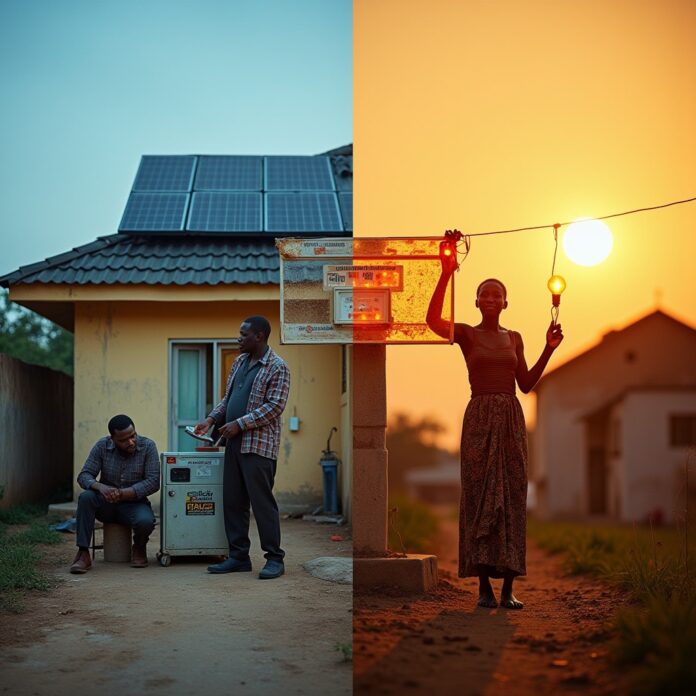Nigeria’s energy crisis is no secret. With grid power unreliable and fuel costs soaring, solar energy isn’t just an alternative—it’s a survival strategy. But how do you choose a solar provider that won’t vanish after installation? This guide decodes Nigeria’s regulatory maze, maintenance pitfalls, and why rural solar trends matter to you, the urban homeowner.
Understanding Nigeria’s Solar Energy Regulatory Landscape
The Tightrope Walk: Compliance vs. Chaos
Nigeria’s regulatory environment is a double-edged sword. On one side, the government is pushing for local manufacturing, citing Presidential Executive Order №5 to prioritize homegrown tech. They’ve even signed agreements for 1.2 GW and 1 GW solar assembly plants, aiming to create jobs and reduce import dependency. But here’s the rub: local production capacity is still nascent. Experts warn that banning imports now could cripple the sector, spike costs, and leave Nigerians in the dark—literally.
Key Regulations for Homeowners:
- SONCAP Certification: Non-negotiable. Every solar panel, inverter, or battery imported must pass the Standards Organisation of Nigeria’s quality checks.
- NERC Licensing: Grid-tied systems require an embedded generation licence. Off-grid projects under 1 MW? Skip the licence but secure a permit.
- State-Level Permits: Lagos isn’t Kano. Each state has its own building codes. Miss this step, and your rooftop project could face fines.
The Elephant in the Room: The proposed solar import ban risks stranding households until local manufacturing scales. Diversify suppliers—partner with local assemblers and certified international brands.
Evaluating Maintenance Contracts and After-Sales Support
From Handshakes to Hard Contracts: Protecting Your Investment
A Lagos homeowner paid millions for a solar system, only to watch dust slash its output by 40%. Their fix? A maintenance contract with free annual cleanings—restoring 30% savings.
What to Demand in a Contract:
- Annual Packages: Routine inspections, cleaning, and performance checks.
- Transparent Pricing: “Generator inverter repair: ₦50,000. Emergency fee after 6 PM: +₦20,000.”
- Warranty Clarity: “Who pays if the inverter fails in Year 3—the manufacturer, or the installer?”
Red Flags: Vague response times (“We’ll fix it soon”) or silence on part replacements.
Rural Market Opportunities – Why Your Next Client Might Live Off-Grid
The Silent Gold Rush: Solar’s Untapped Frontier
A farmer in Nasarawa isn’t just growing maize—he’s powering a processing unit with solar. Rural Nigeria is an $2 billion energy market, fueled by initiatives like the Solar Power Naija Program (5 million solar connections).
Urban Benefits from Rural Growth:
- Lower Costs: Bulk panel purchases for rural projects cut urban prices by 15%.
- PAYG Models: Tested in villages, now attracting Lagos landlords.
- Skilled Technicians: Rural-trained experts solve urban issues like no others.
The Catch: Rural work means bad roads, cultural negotiations, and payment delays. But as Kaduna installer Amina Ado says: “Serve one community well, and referrals flood your city business.”
How to Choose a Reliable Solar Installation Business – No More Guesswork
*The 4-Step Survival Guide*
- Compliance Interrogation: “Show me SONCAP and NERC permits.”
- Maintenance Litmus Test: Avoid providers who call maintenance “unnecessary.”
- Rural Résumé Check: “Have you powered a clinic without grid access?”
- Brand Alliances: Tier-1 partners (Canadian Solar, Tesla) = fewer failures.
Pro Tip: Visit the provider’s office unannounced. A kiosk with one dusty inverter? Run.
Case Studies – When Solar Turns “Light” into “Life”
The Abuja Family That Ditched Generators
The Aliyus spent ₦30,000 monthly on fuel until a 5kW solar system cut bills by 70%. Their secret? Installer EcoFlow NG used rural sandstorm-proofing tricks to shield panels from harmattan winds.
The Rural-Urban Hybrid: Lagos-based SolarKing boosted urban output by 20% using battery algorithms refined in Bauchi mini-grids.
Future Trends – Your Solar System Might Outsmart You
Batteries That “Talk” and Policies That Pay You
- AI-Powered Batteries: Predict outages and auto-charge before NEPA collapses.
- VAT Removal: Save 7.5% on residential solar gear.
- Net Metering 2.0: Sell excess power at commercial rates (₦25,000/month for Lekki homeowners).
The Big Picture: By 2030, solar earnings could fund school fees. One Kaduna family already does it.
Solar isn’t just about power—it’s about possibility. Whether you’re a weary generator user or a rural entrepreneur, the future is bright.


